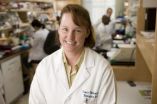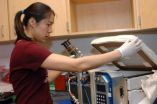(Press-News.org) BOSTON -- Eating a diet high in vitamin D, as well as the nutrients betaine and methionine, might help reduce the risk of macular degeneration, according to new research conducted by Tufts Medical Center scientists. Their study of identical twins from the US World War II Twin Registry also found that the more a person smoked, the higher their risk of developing macular degeneration. The study, "Smoking, Dietary Betaine, Methionine, and Vitamin D in Monozygotic Twins with Discordant Macular Degeneration: Epigenetic Implications" published in the journal Ophthalmology on July 1, is the first to look at identical twin pairs in which one twin had early age-related macular degeneration (AMD), and the other had late stage AMD.
AMD is highly heritable, with genetic factors determining up to 71 percent of the disease's severity as determined by a previous study of this twin registry by this same research team. By examining identical twins with the same genes but whose disease was at different stages, researchers were able to identify environmental and behavioral factors that may contribute to severity of the disease. "We wanted to know why, if they have the same genes, do they have different stages of the disease?'' said lead researcher Johanna M. Seddon, MD, ScM, Director of the Epidemiology and Genetics Service, Tufts Medical Center, and Professor of Ophthalmology, Tufts Universtity School of Medicine.
"Eat a healthy diet with lots of fruits and vegetables, and that can make a difference - even if you have a genetic susceptibility to macular degeneration,'' said Seddon, a specialist in macular degeneration, and, of course, don't smoke.''
Macular degeneration is one of the leading causes of vision loss in older Americans. It occurs when cells in the macula, the part of the eye responsible for clear central vision, gradually die. Macular degeneration can progress so slowly it takes years for serious vision loss to occur but it can also develop rapidly, causing severe vision loss that can make it difficult to drive, read or conduct daily tasks.
Each twin completed a questionnaire about nutritional and health behaviors. The study found that twins whose macular degeneration was at the early stages tended to consume more vitamin D from dietary sources such as fish or milk than their brothers. Vitamin D may reduce the risk of macular degeneration because it has anti-inflammatory properties. It may also block the formation of new blood vessels that can grow under the macula, leaking blood and causing vision loss in the more severe stages of the disease. Similarly, Dr. Seddon's research team also found that higher intakes of betaine and methionine were linked to a slower progression of the disease. These nutrients have also been linked to epigenetic mechanisms, which is a change in DNA, not attributable to a change in the actual DNA sequence. Betaine is found in fish, grains and spinach, while methionine is found in poultry, fish and dairy foods.
The study also found that among the pairs of twins, the twin who was the heavier smoker tended to have the more severe case of macular degeneration. These results indicate that both genetic susceptibility and environmental factors are important, that epigenetic factors may also be involved, and further underscores the importance of modifiable behaviors, especially avoiding smoking and eating a healthy diet, to help prevent or delay the progression of macular degeneration.
The study evaluated pairs of elderly male twins and used a survey of personal dietary and health habits to determine variations.
###
About Tufts Medical Center
Tufts Medical Center is an exceptional, not-for-profit, 415-bed academic medical center that is home to both a full-service hospital for adults and Floating Hospital for Children. Conveniently located in downtown Boston, the Medical Center is the principal teaching hospital for Tufts University School of Medicine. New England Eye Center (NEEC) is the ophthalmology department for Tufts Medical Center
and Tufts University School of Medicine. New England Eye Center offers a full range of
comprehensive ophthalmology including treatments for cataracts, glaucoma, macular
degeneration, pediatric ophthalmology and aesthetic surgery. For more information, please visit www.tuftsmedicalcenter.org.
Twin study shows lifestyle, diet can significantly influence course of macular degeneration
Even individuals with a high genetic risk can make a difference in their disease progression
2011-07-07
ELSE PRESS RELEASES FROM THIS DATE:
Researchers engineer functioning small intestine in laboratory experiments
2011-07-07
LOS ANGELES (July 5, 2011) – Researchers at The Saban Research Institute of Children's Hospital Los Angeles have successfully created a tissue-engineered small intestine in mice that replicates the intestinal structures of natural intestine—a necessary first step toward someday applying this regenerative medicine technique to humans.
The study led by Tracy C. Grikscheit, MD —"A Multicellular Approach Forms a Significant Amount of Tissue-Engineered Small Intestine in the Mouse"— has been published in the July issue of Tissue Engineering Part A, a premier biomedical journal. ...
Final space shuttle to carry 5 CU-Boulder-built payloads
2011-07-07
The University of Colorado Boulder is involved with five different space science payloads ranging from antibody tests that may lead to new bone-loss treatments to an experiment to improve vaccine effectiveness for combating salmonella when Atlantis thunders skyward July 8 on the last of NASA's 135 space shuttle missions.
One experiment, sponsored by the global pharmaceutical companies Amgen and UCB, will test an antibody to sclerostin -- a protein that has a negative effect on bone formation, mass and strength -- on lab mice flying on the shuttle. Researchers on the project ...
Eggs may help prevent heart disease and cancer
2011-07-07
One of nature's most perfect foods may be even better for us than previously thought.
While eggs are well known to be an excellent source of proteins, lipids, vitamins and minerals, researchers at the University of Alberta recently discovered they also contain antioxidant properties, which helps in the prevention of cardiovascular disease and cancer.
Jianping Wu, Andreas Schieber and graduate students Chamila Nimalaratne and Daise Lopes-Lutz of the U of A Department of Agricultural Food and Nutritional Science examined egg yolks produced by hens fed typical diets of ...
Self-paced walking test useful for evaluating progress in lifestyle intervention programs
2011-07-07
HOUSTON- (July 5, 2011) - The self-paced walking test, known as the 400-meter walk test, is effective in measuring improved physical function in postmenopausal women who have lost weight through healthy physical activity and dietary changes, according to collaborative research conducted by The University of Texas Health Science Center at Houston (UTHealth) and The University of Pittsburgh.
"The 400-meter self-paced walk test is a simple, cost-efficient and effective test clinicians or researchers can use to evaluate progress in a weight loss or physical activity program," ...
Being small has its advantages, if you are a leaf
2011-07-07
The size of leaves can vary by a factor of 1,000 across plant species, but until now, the reason why has remained a mystery. A new study by an international team of scientists led by UCLA life scientists goes a long way toward solving it.
In research federally funded by the National Science Foundation, the biologists found that smaller leaves are structurally and physiologically better adapted to dry soil because of their distinct vein systems.
The research will be published in an upcoming print issue of the journal Plant Physiology and is currently available in ...
USC researchers link genetic marker to rectal cancer treatment
2011-07-07
A team of researchers led by Keck School of Medicine of the University of Southern California (USC) oncologist Heinz-Josef Lenz, M.D., has identified a genetic marker that may predict which patients with rectal cancer can be cured by certain chemotherapies when combined with surgery. The discovery, scheduled for publication in the August 1 edition of Clinical Cancer Research, brings doctors closer to customizing cancer treatment to individual patients.
Lenz, professor of medicine and preventive medicine in the division of medical oncology at the Keck School and the study's ...
Old life capable of revealing new tricks after all
2011-07-07
Archaea are among the oldest known life-forms, but they are not well understood. It was only in the 1970s that these single-celled microorganisms were designated as a domain of life distinct from bacteria and multicellular organisms called eukaryotes.
Robert Gunsalus, a UCLA professor of microbiology, immunology and molecular genetics, developed an interest in Archaea because of their ability to thrive in harsh environments. Now, using state-of-the-art imaging equipment at the California NanoSystems Institute (CNSI) at UCLA, he has shown for the first time that a type ...
Ruminant headgear: A mystery awaiting unraveling
2011-07-07
EUGENE, Ore. -- Emerging from the heads of most cud-chewing mammals, headgear inspire an almost mystical and certainly majestic aura. But, scientists say, we know shockingly little about them.
In a paper appearing online ahead of regular publication in the Proceedings of the Royal Society B, a London-based international journal dedicated to biology, a three-member scientific team spells out what is known -- and not known -- about antlers, horns, pronghorns and ossicones.
For antlers, think deer, moose and elk. Horns are worn by cattle, sheep and goats; ossicones by ...
Gene therapy stimulates protein that blocks immune attack and prevents Type 1 diabetes in mice
2011-07-07
Increasing a specific protein in areas of the pancreas that produce insulin blocks the immune attack that causes type 1 diabetes, researchers reported in the August issue of the Journal of Clinical Investigation, published early online.
The discovery could lead to a drug that prevents the progression of type 1 diabetes in people newly diagnosed who are in the "honeymoon" phase of the disease, when the immune system has not yet destroyed all of the insulin-producing beta cells in the pancreas.
The finding could also lead to new drugs for overcoming organ rejection in ...
Childhood asthma linked to depression during pregnancy
2011-07-07
July 5, 2011– Anxiety, stress and depression during pregnancy may lead to a greater risk of asthma for your child, according to researchers at Columbia University's Mailman School of Public Health. Study results are published in the July issue of Annals of Allergy, Asthma & Immunology, the scientific journal of the American College of Allergy, Asthma and Immunology (ACAAI).
"Approximately 70% of mothers who said they experienced high levels of anxiety or depression while they were pregnant reported their child had wheezed before age 5," said Marilyn Reyes, senior research ...
LAST 30 PRESS RELEASES:
A promising potential therapeutic strategy for Rett syndrome
How time changes impact public sentiment in the U.S.
Analysis of charred food in pot reveals that prehistoric Europeans had surprisingly complex cuisines
As a whole, LGB+ workers in the NHS do not experience pay gaps compared to their heterosexual colleagues
How cocaine rewires the brain to drive relapse
Mosquito monitoring through sound - implications for AI species recognition
UCLA researchers engineer CAR-T cells to target hard-to-treat solid tumors
New study reveals asynchronous land–ocean responses to ancient ocean anoxia
Ctenophore research points to earlier origins of brain-like structures
Tibet ASγ experiment sheds new light on cosmic rays acceleration and propagation in Milky Way
AI-based liquid biopsy may detect liver fibrosis, cirrhosis and chronic disease signals
Hope for Rett syndrome: New research may unlock treatment pathway for rare disorder with no cure
How some skills become second nature
SFU study sheds light on clotting risks for female astronauts
UC Irvine chemists shed light on how age-related cataracts may begin
Machine learning reveals Raman signatures of liquid-like ion conduction in solid electrolytes
Children’s Hospital of Philadelphia researchers emphasize benefits and risks of generative AI at different stages of childhood development
Why conversation is more like a dance than an exchange of words
With Evo 2, AI can model and design the genetic code for all domains of life
Discovery of why only some early tumors survive could help catch and treat cancer at very earliest stages
Study reveals how gut bacteria and diet can reprogram fat to burn more energy
Mayo Clinic researchers link Parkinson's-related protein to faster Alzheimer's progression in women
Trends in metabolic and bariatric surgery use during the GLP-1 receptor agonist era
Loneliness, anxiety symptoms, depressive symptoms, and suicidal ideation in the all of us dataset
A decision-support system to personalize antidepressant treatment in major depressive disorder
Thunderstorms don’t just appear out of thin air - scientists' key finding to improve forecasting
Automated CT scan analysis could fast-track clinical assessments
New UNC Charlotte study reveals how just three molecules can launch gene-silencing condensates, organizing the epigenome and controlling stem cell differentiation
Oldest known bony fish fossils uncover early vertebrate evolution
High‑performance all‑solid‑state magnesium-air rechargeable battery enabled by metal-free nanoporous graphene
[Press-News.org] Twin study shows lifestyle, diet can significantly influence course of macular degenerationEven individuals with a high genetic risk can make a difference in their disease progression


